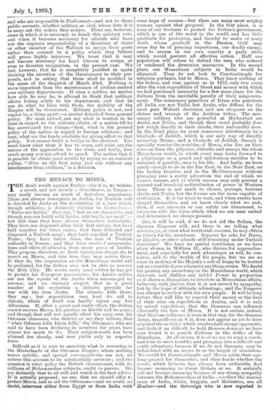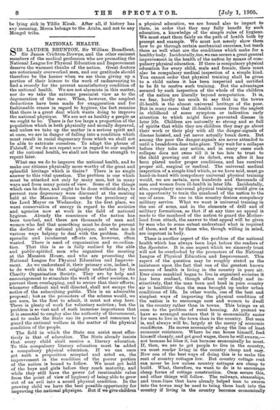T HE Arab revolt against Turkey—for it is, we believe, a,
revolt, and not merely a disturbance, in Yemen— may easily become an event of first-class importance. There are always insurgents in Arabia, for Turkish rule is detested by Arabs as the domination of a race which, though orthodox, is distinctly inferior to themselves— "Turks are bricks," they say, "but we are diamonds, and though you can build with.bricks, still bricks are mud "- but this time they have shown themselves formidable. They have not dispersed after their first victory, but have held together for three years ; they have defeated and dispersed a Turkish army ; they have expelled a Turkish Pasha ; they have taken San a, the seat of Turkish authority in Yemen ; and they have received congratula- tions and offers of adhesion from many parts of Arabia. They propose, therefore, as Arab insurgents always do, to march on Mecca, and this time they may arrive there. If they do, the impression on the Mussulman world will be profound, for the _Sultaa may not be able to recover the Holy City. He wants every good soldier he has got to protect his European possassions ; his Asiatic militia are not the equals of the Arabs when encouraged by success ; and we strongly suspect_ that in a great number of his regiments a distaste prevails for war with the true Arabs. The climate kills them, they say ; but superstition, may lend its aid to climate, which of itself can hardly injure any but Albanians. If, after a great and costly effort, the Sultan cannot recover Mecca, his prestige as Khalif will be gone ; and though that will not greatly affect his sway over his Ottoman clansmen, who believe, or say they believe, that "when Othman falls Islam falls," the Ottomans, who are said to have been declining in numbers for years, have almost too much to do. Their subjectaworld has been skinned too closely, and now yields only to superior force.
Difficult as it is ever to ascertain what is occurring in the Hinterlands of the Ottoman Empire, where nothing moves quickly, and special correspondents are not, we believe this account to be substantially accurate ; and the question is what policy the British Government, with its millions of Mohammedan subjects, ought to pursue. We say distinctly that to sit still and watch is the best advice. It- is actually proposed, we -see, that we should offer to protect Mecca, and so aid the Ottomans—and we could, no doubt, intervene either from Egypt or from India with some hope of success—but there are many most weighty reasons against that proposal. In the first place, it is none of our business to protect the Sultan's government, which is one of the worst in the world, and has little gratitude for protection, and thereby to make of every Arab, whose goodwill in the Persian Gulf may some day be of pressing importance, our deadly enemy, and to arouse in our own country a party strife which would prevent all effective action. Half our population will refuse to defend the men who ordered or condoned the Armenian massacres. In the second place, our Mussulman subjects in India would. be alienated. They do not look to Constantinople for religious guidance, but to Mecca. They kmow nothing of the Sultan, and rose against us in 1857, only two years after the vast expenditure of blood. and money with which we had purchased immunity for a few more years for the Sultans from the inevitable penalty of their misgovern- ment. The missionary preachers of Islam who penetrate all India are not Turks but Arabs, who diffuse for the most part Waha.bi doctrines, and are eloquent on the claims and wrongs of the Arabian tribes. The mer- cenary soldiery who are powerful at Hyderabad are Arabs, not Turks, and though their creed probably does not weigh heavily in their minds, their nationality does. In the third place, we must commence interference by a blockade of Jeddah, which is our only way of directly menacing Mecca ; and a blockade of Jeddah, though it specially worries the notables of Mecca, who live on their revenue from the pilgrims, disturbs and annoys the whole Mussulman world, in which every man looks forward to a pilgrimage as a grand and meritorious sacrifice to be incurred, if possible, once in his life. And lastly, we have surely enough to do in the Far East, in the Near East, on the Indian frontier, and in the Mediterranean without plunging into a costly adventure the end of which we cannot foresee, and in which success may only prevent a natural and beneficial redistribution of power in Western Asia. There is not much to choose, perhaps, between Arabs and Turks, but the former are the more capable of civilisation. It is far wiser to wait, and when events have shaped themselves, and we know clearly what we seek, then, if our interests or our safety are threatened, to intervene with the force which, when we are once united and determined, we always possess.
But, it will be said, if we do not aid the Sultan, the German Emperor will, and there is no telling what advantages, or even what territorial cessions, he may obtain in return for his assistance. Suppose he asks for Barca„ or Rhodes, or other islands still remaining under Turkish dominion? We have no special confidence, as we have often shown, in William II., who thirsts for aggrandise- ment, and especially for such advantages as will, he con- ceives, add to the wealth of his people, but we see no sense in making of his Majesty a sort of bogey to be trotted out as a terrible figure whenever anything occurs. We doubt his gaining any ascendency in the Mussulman world, which distrusts and dislikes any infidel Power in proportion as it shows a disposition to interfere in Mussulman affairs, believing, with justice, that it is not moved by sympathy, but by the hope of ultimate advantage ; and the Emperor has always to reckon with his own people. It will be long before they will like to expend their money or the lives of their sons on expeditions in Arabia, and it is only by actual expeditions that the Germans can influence effectually the fate of Mecca. It is not certain, indeed, that they can influence it even in that way, for the German Army, magnificent as it is, does not appear as yet to have acquired the mobility which crushes half-savage opponents, and finds it as difficult to hold Hereros down as we have ever found it to punish Pathans in the defiles of the Himalayas. At all events, it is of no use to send a coach- and-four to meet, trouble; and plunging into a difficult and costly adventure, because if we do not Germany may be beforehand with us, seems to us the height of unwisdom. We would let Constantinople and Mecca settle their age- long quarrel for themselves, and, then decide whether the result, which hitherto has always been endurable, had become menacing to Great Britain or no. It certainly will not become menacing because of any strong sympathy between the Mohammedans of India—recollect the warrior races of India, Sikhs, Eajputs, and. Mahratta,s, are all Hindoo-7and the Sovereign who is now reported to be lying sick in Yildiz Kiosk. After all, if history has any meaning, Mecca belongs to the Arabs, and nob to any Mongol tribe.,











































 Previous page
Previous page